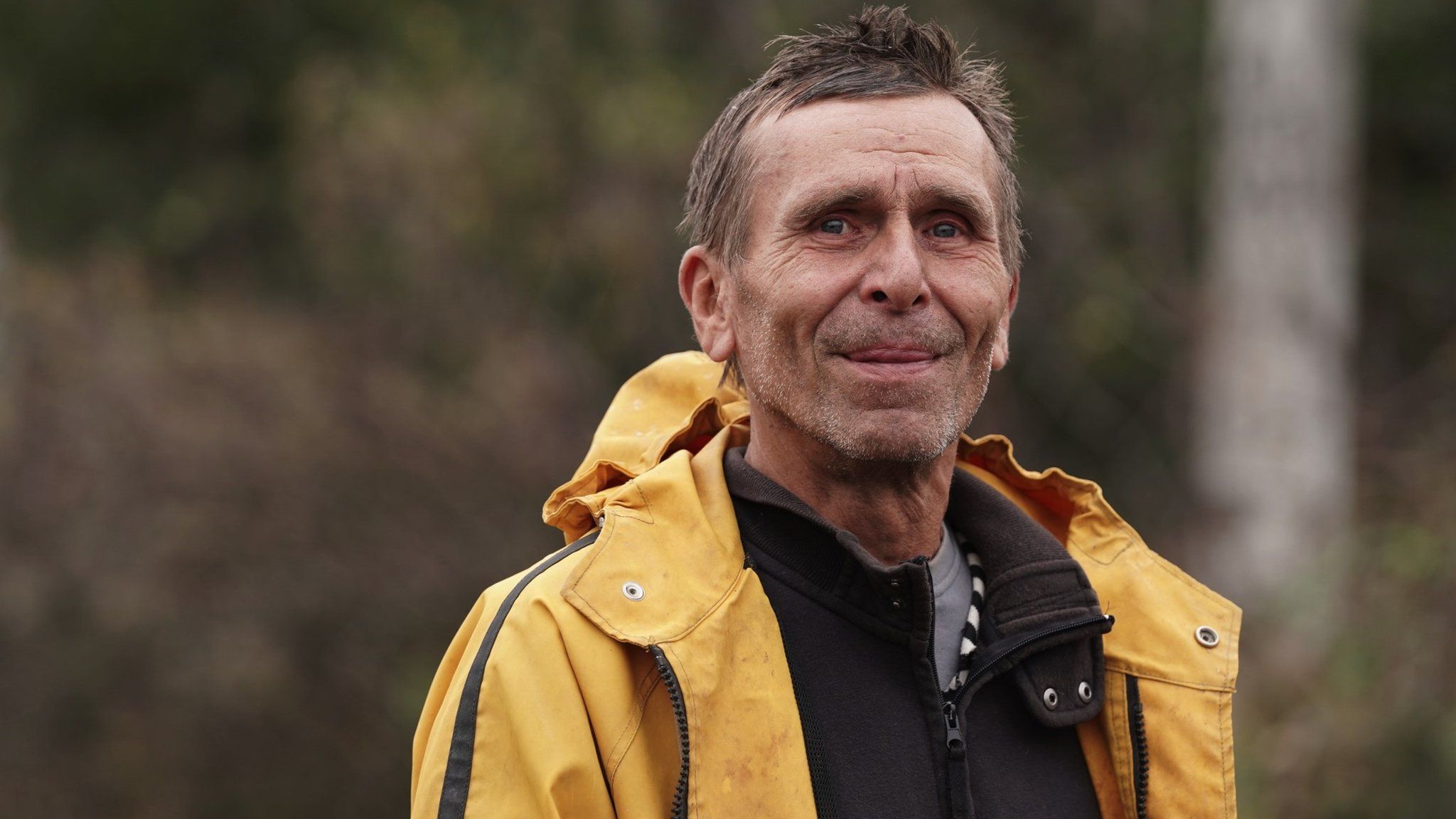ARTICLE AD BOX
by Oleg Karpyak
ВВС News, Velyki Prohody near Kharkiv

The Russians sent Oleksandr to "the pit" twice and searched his house four times
A Christmas tree wrapped in suspicious looking wires grows on the lawn near an abandoned village building. It is dangerous to go closer - you can come across a mine anywhere here. So we look through our camera lenses.
False alarm. The wires are not explosives, but the remains of New Year decorations which had not been removed before the Russian invasion on February 24.
We are in the village of Velyki Prohody near the eastern Ukrainian city of Kharkiv, 10 kilometres from the Russian border. Over the past weeks, the Ukrainian army, in a rapid offensive, liberated dozens of villages like this one.
But the Russian army has left its mark.
On the wall behind the Christmas tree, a large white letter "Z" is visible. The sign is everywhere: on old cars, farm equipment, fences, on the walls of gutted houses. Some, though, have now been painted over with fresh paint.
In some streets, there is not one single surviving house. There are burnt cars along the roads. A battered armoured vehicle, is rusting in the bushes. Its caterpillar track, placed near the edge of the road, now serves as a speed limiter in front of the checkpoint.
Oleksandr is a pensioner, and a former electrician and mechanic.
"Of course, I'm glad that the village has been liberated. I was a partisan here for six months," he says proudly. "Every day was a war for me. My personal war."
He stole ammunition from Russian soldiers, put bars of soap into their fuel tanks, and drained diesel from their vehicles.
He suspects that one of the neighbours reported his activities, because he was subjected to regular searches of his house, and twice he was put into "the pit". This was a dark basement in the nearby village of Mali Prohody, which served as a prison. He was taken there with a sack on his head.
Mines could be anywhere, even a Christmas tree wrapped in suspicious wires
"I learned that basement inside out," he says. "I could distinguish people by only their voices. The floor was wet. Nothing to lie on. A few torn tyres, nothing else."
He says his Russian captors did not seem to care about the conditions in which he was kept. They would bring him food that had gone off. Conditions were overcrowded.
"You ask them: 'Give me some toilet paper,'" he says. "You hear the answer: 'I'll punch you in the face right now.'"
Oleksandr's wife, Lyubov agrees. "They never address you in a polite way, no matter how old you are."
She was also detained by the Russians, not in the basement but in the premises of an abandoned store.
"Eighteen men in a room and I'm the only woman. Can you imagine? I'm 64 years old. No washing, nothing. It's terrible," says Lyubov.
She says she was not tortured or interrogated. But she heard screams through the walls - someone she believes was being electrocuted: "At first we thought they were torturing a child, because a young voice was screaming. It turned out that it was a woman."
Other residents of the village also speak about detentions, abuse and forced labour.
We did not find evidence that any civilians were killed here. However, the military showed us the place where Russian soldiers threw the bodies of three Ukrainian soldiers who died in battles at the beginning of the war. They were left lying on a pile of rubbish among some bushes.
Ukraine says their bodies will be taken for examination and buried with military honours.
We see the village council building, where Russian soldiers and officers lived. Judging by the hand-made plaques on the doors, this building served as a military hospital with an isolation room and other wards. An icon of St. Nicholas, Russia's most beloved saint, is hanging on the wall.
There are also two children's drawings. One of them features a red flower and a heart surrounded by five-pointed stars and the letter Z. The other portrays the figure of a girl in headphones, standing on a rainbow, facing the sun, and holding two red hearts in her hands. A grey letter Z is hesitantly drawn in the corner.
A child's drawing on the wall of the village council
"Thin, small, just a kid"
Their village may be largely in ruins, but Oleksandr and Lyubov radiate joy.
"Now I have nothing to fear. And I am not a chicken-hearted type. I've become even more confident in myself. Had I been younger, I would have gone to the fighting with you," Oleksandr brags to some Ukrainian soldiers.
I ask how his experiences have changed him.
"I don't even know what to say to you. The hatred for these creatures has increased," he says in Russian.
Yet immediately he adds: "But I know that there are decent guys, decent Russians. Of different ages. And they don't want this war. They don't want to shoot."
Over a hundred people live in the village. The inscription on the gate says "People live here"
Oleksandr says that although most Russians in their village behaved extremely rudely and cruelly, some of them were compassionate.
The soldier who guarded him during his first arrest called him by the informal nickname "Uncle Sasha", and told him: "You are older than my father. Forgive me for what is happening."
Lyubov has similar conflicted views. She has just called the Russian army "cattle" and said that "they bark at everything."
But suddenly she remembers an encounter with a Russian soldier that makes her face light up: "I have a grandson who is 26 years old. And this one [a soldier] was very young, younger than my grandson. He stands in front of me, thin, small, just a kid. He stands and says: "Oh, a plum. He has never seen a plum."
Of the several dozens of farmers who survived the occupation in Velyki Prohody, there are mainly elderly people. There are no children on the streets. No one is hurrying to return to the village.
A wire is stretched at the roadside, hinting at the dangers of leaving the path.The Ukrainian military says mines can be found anywhere here - in the grass, in the bushes, in both destroyed and intact houses.
Mines could found in both intact and destroyed houses
One of the explosives experts accompanying us pulls a rectangular, bent, sand-coloured box on thin legs from the boot of his car. It is a MON-50 anti-personnel mine that he found in the grass near the village council. Such mines are prohibited by an international convention - although Russia has not signed up to it.
"Imagine, this land is still full of shells from the Second World War," he says.
As we speak, muffled explosions are heard over the horizon. There is still a lot of work to be done, and it is going on.

 2 years ago
18
2 years ago
18








 English (US) ·
English (US) ·